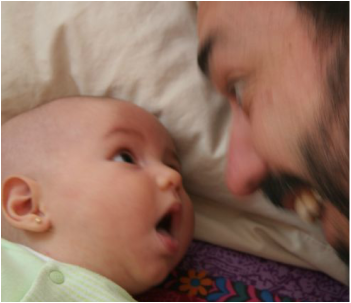What value does this research hold for early childhood providers?
- Both genes and environment play a major role in early language development. "Learning for the infant brain is not a passive process. Social interaction is an essential prerequisite for mastering a language." (Kuhl, 2015, p.68)
- Babies and toddlers need to look into the eyes of adults to learn words. They follow the gaze of the eyes in order to connect words to objects and meaning.
- Baby Talk spoken by caregivers is a very important component in the process of learning sounds. The exaggerated sounds of adult baby talk enable babies to master the fluency of the language, and the higher pitched tone typically used in baby talk by adults attracts the attention of the baby.
- A 2013 study with 9-month old babies demonstrated that children learn language best when interacting socially in order to learn it. In this study, learning through television and audio demonstrated no learning outcome at all.
- There is also a motivational component to learning language through social interaction. The brain's reward centers are activated during the process when there is a social interaction involved.
- The author's current research is demonstrating that babies learn better when they are among other babies. Her team is exploring the explanation for this.
- By six months of age, babies are ready to begin learning the sounds of the language spoken by caregivers. The same applies to a child who is exposed to a second language.
- Babies (people) most easily pick up a second language between six months and seven years of age.
Consider the Insights from Neuroscience when Caring for Infants and Young Children in Your Daily Work or Family Routine.
Kuhl, P. K. (2015, November). Baby talk. Scientific American, 64-69.

 RSS Feed
RSS Feed

